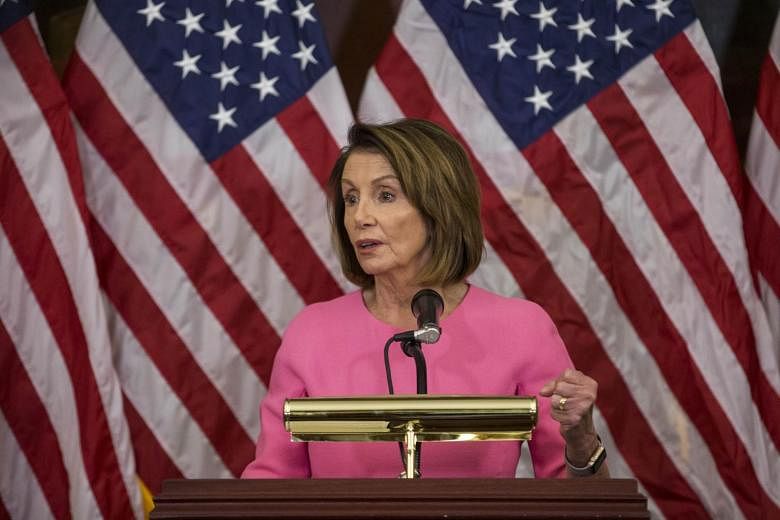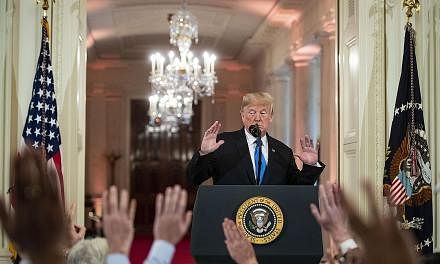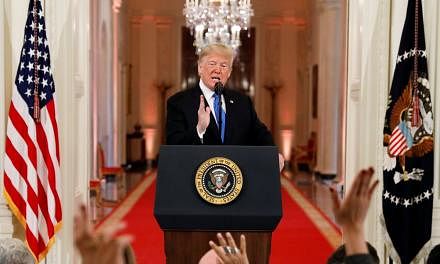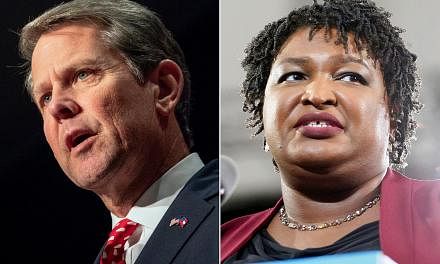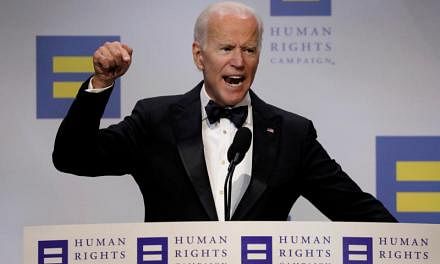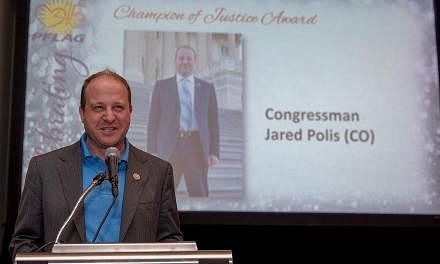WASHINGTON (NYTIMES) - Two days after midterm congressional elections that handed them control of the House, triumphant Democrats dialled in to their first conference call since winning the majority to strategise on the way forward.
But the call that Representative Nancy Pelosi, a California Democrat, currently the House minority leader, convened on Thursday (Nov 8) with Democratic lawmakers and their newly elected colleagues was not a planning session on how to protect health care coverage or lower prescription drug prices, thematic pillars of the party's successful campaigns.
It was a briefing about President Donald Trump's latest remarkable move - his decision, hours after the last polls closed, to fire the attorney-general - and a discussion of how Democrats would address the cascade of potentially grave constitutional consequences that could follow.
The strategy session highlighted the central challenge that Democrats face as they prepare to assume control of the House in a new era of divided government that begins in January.
Democrats, who remained remarkably focused during their campaigns, must now figure out how to put forward their own agenda - one Ms Pelosi says will be focused on lowering drug costs, rebuilding the nation's roads and bridges, and cleaning up government corruption - even as they deal with the provocations of a president who relishes confrontation and disdains institutional norms.
"Trump's great genius is to try and reduce everyone to his level and approach, and he wants to be able to paint Democrats as single-mindedly bent on his destruction," said Mr David Axelrod, a Democratic strategist and former top adviser to Barack Obama.
"These Democrats didn't get elected, by and large, to war with Trump. They got elected to try and get some positive things done on issues like healthcare and economic issues for their constituents, and the notion that on Day 1 they should spend all their energy trying to bedevil him is wrong. Striking the balance is going to be difficult."
Ms Pelosi, who hopes to reclaim her post as Speaker in the new Congress, has encouraged fellow Democrats in private meetings to resist the urge to leap at Mr Trump's every utterance and misdeed - "I don't think we'll have any scattershot freelancing," she told reporters last week - lest they lose focus and play into his hands.
"The message is really, 'Don't chase every ball that he throws. We have to show the American people that there's a purpose behind everything that we do, and it's not just to get a pound of flesh,'" said Representative Eric Swalwell, a California Democrat.
At the same time, there is a giant pent-up appetite among Democrats to hold Mr Trump and his administration accountable in ways that Republicans have refused to over the past two years.
"It's starting to set in for me that we don't have to live this way anymore, we actually can do something to stop abuse of power, and I think it's important to show the American people that we're going to do that, because that's what they voted for," Mr Swalwell said.
The dynamic was on display on Sunday, as top Democrats fanned out to the morning television news programmes to talk extensively about the avenues they intended to pursue to investigate Mr Trump and check his power.
There was little talk of a proactive policy agenda as Representative Adam Schiff, a California Democrat, the incoming chairman of the House Intelligence Committee, warned on NBC's Meet the Press that Mr Matthew Whitaker, who is acting as attorney-general after the removal of Mr Jeff Sessions, must have no role in the special counsel's Russia investigation.
Representative Jerrold Nadler, a New York Democrat, the incoming Judiciary Committee chairman, said he would subpoena Mr Whitaker if necessary, making him the committee's first witness after the new Congress convenes in January.
And Representative Elijah Cummings, a Maryland Democrat, who will assume the helm of the Oversight and Government Reform panel, said that while he was "not going to be handing out subpoenas like somebody's handing out candy on Halloween", he planned to delve into a number of subjects, including the administration's handling of the healthcare law and its addition of a citizenship question to the census.
Striking the right balance is a political imperative for Democrats, who owe their majority to a new, younger and more diverse crop of members-elect - about half of them women - many of whom won races in centrist or Republican-leaning areas after campaigning as change agents.
Ms Pelosi and other top Democrats toiled during the campaign to stay wedded to a carefully honed, poll-tested agenda that would be broadly popular, calling, for example, for protecting the Affordable Care Act rather than promising to replace it with a single-payer health coverage plan.
Democrats talked about a broad, bipartisan infrastructure plan of the sort that Mr Trump campaigned on.
They have also promised to restore checks and balances to a presidency that has gone unchecked under two years of all-Republican rule on Capitol Hill, and are eyeing investigations of the administration's environmental policies, its undercutting of the healthcare law, and its family separation policy, to name just a few.
And they face consequential decisions about whether to engage in a potentially fierce legal battle over Mr Trump's tax returns and, ultimately, about whether to impeach him.
While Mr Trump said after the election that he would "like to see bipartisanship", he also said he would not tolerate congressional investigations into him and his administration.
"If you're in tough seats like a lot of these new members are, if we just go all left - just impeachment and obstructionism - then I believe we lose in 2020," said Representative Josh Gottheimer, a New Jersey Democrat, who is part of a bipartisan group of lawmakers calling itself the Problem Solvers Caucus that has proposed overhauling House rules to give rank-and-file lawmakers more input and influence.
"The best way for us to win, and if you look at how we just won the House, it was through the middle, not through the left," Mr Gottheimer said.
"You're going to have a lot of members who are going to want to govern how they ran, and that's not banking left."
He said that in addition to healthcare, Democrats should focus on issues for which there is bipartisan consensus, such as infrastructure, and an immigration overhaul that would pair border security with a path to citizenship for "Dreamers", a group of unauthorised immigrants brought to the United States as children.
The internal debates will play out in the coming weeks as Democrats choose their leaders for the next Congress.
Ms Pelosi has said she is "100 per cent" certain that she will be Speaker - reprising her role as the first woman to hold that role - and no lawmaker has come forward so far to challenge her.
But among Democrats, as they enter a lame-duck session of Congress that begins on Tuesday, there are quiet conversations about a desire for change at the top.
Ms Pelosi, 78, has been the top Democrat for 15 years, while both Representative Steny Hoyer of Maryland, 79, who wants to be the majority leader, and Representative James Clyburn of South Carolina, 78, who is seeking the post of whip, have been in the No. 2 and No. 3 positions for 11 years.
A small group of Democrats, including Mr Gottheimer, has said they will withhold their votes for Speaker until they secure a commitment to overhaul the way business is done in the House.
But it is not clear who would step up to challenge Ms Pelosi, a legendary vote-counter and political dealmaker whose allies say is the obvious person to ensure that Democrats do not squander their majority.
"Who's going to run against her who can put together the support and who can do this job, with a crazy, increasingly unchecked president in the White House and a rubber-stamp for a Senate?" said Mr Steve Elmendorf, a former senior aide to Ms Pelosi. "This is not the time for on-the-job training."
Still, some lawmakers argue that the transparency and good-government measures that Ms Pelosi is offering are not enough to ensure a successful majority.
"Here's something that distresses me," said Representative Dina Titus, a Nevada Democrat.
"What Pelosi says is going to be the Democratic agenda is the exact same agenda we had after the 2006 election. The public cares about issues like gun violence and protecting Dreamers - those should be our first two bills. We don't seem to have a new agenda."
Representative Henry Cuellar, a Texas Democrat and a member of the centrist Blue Dog Coalition, has also said he is seeking Ms Pelosi's assurances that lawmakers who share his more conservative bent will be involved in decision-making.
He said it was vital that Democrats check the urge to use their newfound power to pursue vendettas against Mr Trump, either through an early bid to impeach him or other means.
"Temper, they've got to temper themselves - don't get excited," Mr Cuellar said, making a pump-the-brakes gesture with both hands.
"If we're going to start off with impeachment and this and this, the American public is going to say, 'Who did we just put in charge?' So we have to come out and just address the issues."
Mr Cuellar, who was first elected in 2004, noted that the ranks of his centrist group peaked at 54 and were now down to a third of that.
"I don't want that to happen again - I don't want to be in the majority two years and then get kicked out again," he said. "We've got to start off on the right foot."
Ms Katie Hill, who was elected last week to represent a Los Angeles-area district that had been in Republican hands for years, said she was conscious of the challenge she and other swing-district candidates face in Washington: maintaining a focus on the issues that their campaigns were centred on, instead of Mr Trump.
"We have to recognise that he has maintained the initiative for the last several years by forcing us to react to what he's doing," Ms Hill said. "I think that's a big mistake on our part - not just Democrats, everyone in this country."
She said that once in Washington, she would balance her district responsibilities with the severity of Mr Trump's actions and words.
Focusing on investing in her local presence, she said, is one way she plans to tune out Mr Trump's Twitter megaphone.
"If there's something that's a constitutional crisis, then sure, yeah, we have to talk about that," she said.
"But if he's just making some kind of ridiculous statement to try to detract from what's going on, I'll try to bring the conversation to something different."
